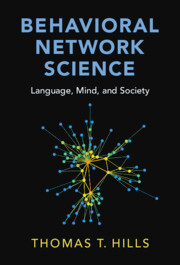Book contents
- Frontmatter
- Contents
- Additional Resources
- Introduction: Structure Matters
- Part I A Brief Guide to Network Science
- Part II Language
- 4 Zipf’s Law of Meaning: The Degree Distribution of the Mind
- 5 Network Learning: Growing a Lexicon by Degrees
- 6 What Is Distinctive: Exploring Edge Types in Multilayer Networks
- 7 The Small-World Spectrum: Using Small Worlds to Compare Networks
- 8 The Birthplace of New Words: Identifying Node Origins
- 9 Agent-Based Models of Language Emergence: Structure Favors the Orangutan
- Part III Mind
- Part IV Society
- References
- Index
9 - Agent-Based Models of Language Emergence: Structure Favors the Orangutan
from Part II - Language
Published online by Cambridge University Press: 08 November 2024
- Frontmatter
- Contents
- Additional Resources
- Introduction: Structure Matters
- Part I A Brief Guide to Network Science
- Part II Language
- 4 Zipf’s Law of Meaning: The Degree Distribution of the Mind
- 5 Network Learning: Growing a Lexicon by Degrees
- 6 What Is Distinctive: Exploring Edge Types in Multilayer Networks
- 7 The Small-World Spectrum: Using Small Worlds to Compare Networks
- 8 The Birthplace of New Words: Identifying Node Origins
- 9 Agent-Based Models of Language Emergence: Structure Favors the Orangutan
- Part III Mind
- Part IV Society
- References
- Index
Summary
For any form of communication to make it beyond the category of talking to oneself, at least two individuals must share a common lexicon. Before languages can evolve into more complex forms, there must first be a pragmatic sense in which one individual can communicate a basic idea to another. How might shared lexicons have originated? Standard explorations of language often look in well-connected social groups such as chimpanzees, frequently numbering in the tens of individuals. But we might ask if language perhaps didn’t begin in a more humble arrangement, involving social groups of just two or a few individuals, such as that found in the orangutan? Agent-based models combined with network science offer a way to study this problem. By treating nodes as agents with strict rule-based behavior and edges as opportunities for interaction, agent-based models provide frameworks for studying how behavior and connectivity interact to create emergent phenomenon, such as the evolution of cooperation and cultural change. Here we will explore an agent-based model of the naming game to address how structure influences the emergence of shared lexicons.
Keywords
Information
- Type
- Chapter
- Information
- Behavioral Network ScienceLanguage, Mind, and Society, pp. 129 - 140Publisher: Cambridge University PressPrint publication year: 2024
